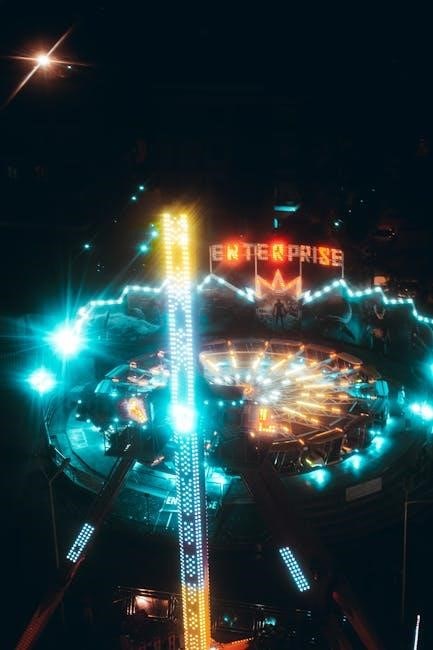Star Trek: Enterprise‚ launched in 2001‚ explores humanity’s early ventures into space with the NX-01 crew. This prequel series sets the stage for The Original Series‚ blending action‚ diplomacy‚ and moral dilemmas in a fresh‚ nostalgic narrative.
Overview of the Series
Star Trek: Enterprise‚ set in the 22nd century‚ follows the crew of Earth’s first Warp 5-capable vessel‚ the NX-01. The series explores humanity’s early steps into interstellar exploration‚ blending action‚ diplomacy‚ and character-driven storytelling. As a prequel to The Original Series‚ it lays the groundwork for the United Federation of Planets‚ showcasing the challenges of first contact and the moral dilemmas of deep space travel.
The series emphasizes the struggles of a less-experienced crew navigating uncharted territories‚ often relying on raw ingenuity and courage. Its narrative weaves through political tensions‚ alien encounters‚ and personal growth‚ offering a fresh yet nostalgic perspective on the Star Trek universe.
Historical Context and Significance
Star Trek: Enterprise serves as a prequel to the Star Trek franchise‚ chronicling the early days of humanity’s ventures into deep space. Set in the 22nd century‚ it bridges the gap between Earth’s first Warp 5 vessel and the formation of the United Federation of Planets. The series highlights the struggles of initial exploration‚ emphasizing raw courage and ingenuity over advanced technology. Its narrative explores the ethical dilemmas and challenges of first contact‚ laying the groundwork for the ideals of peace and cooperation that define the Federation; As the first Starfleet vessel capable of deep space exploration‚ the NX-01 Enterprise symbolizes humanity’s ambitious leap into the unknown‚ shaping the future of interstellar relations and Starfleet’s mission.
Season 1 Episode Guide
Season 1 introduces the crew of the NX-01 Enterprise‚ exploring uncharted worlds and encountering diverse alien species. Episodes like “Broken Bow” and “The Andorian Incident” highlight early struggles and diplomacy.
Broken Bow (Episodes 1 & 2)
“Broken Bow” is the two-part pilot episode of Star Trek: Enterprise‚ marking the franchise’s return to its roots. The story introduces Captain Jonathan Archer and his crew as they embark on humanity’s first deep-space mission. The episode centers around the Klingons’ pursuit of a Suliban agent‚ leading to the theft of Earth’s warp coil. This incident propels the Enterprise into its maiden voyage earlier than planned. The crew must navigate uncharted territory‚ encountering unexpected challenges and alien species. The episode sets the tone for the series‚ blending action‚ diplomacy‚ and character development. It also explores the moral dilemmas of first contact and humanity’s readiness for interstellar exploration. Originally airing on September 26‚ 2001‚ “Broken Bow” received a rating of 3‚ indicating it’s worth watching for fans new to the series.
Fight or Flight (Episode 3)
“Fight or Flight” is the third episode of Star Trek: Enterprise‚ airing on October 3‚ 2001. The crew encounters a distressed alien vessel‚ leading to a moral dilemma: whether to intervene or observe. Ensign Hoshi Sato plays a key role in deciphering the aliens’ language‚ showcasing her skills. The episode explores the ethical challenges of first contact and the crew’s readiness for such encounters. With a rating of 3‚ it’s considered a solid‚ enjoyable watch for new fans‚ offering insight into the early days of humanity’s interstellar exploration and the evolving dynamics of the Enterprise crew.
Strange New World (Episode 4)
“Strange New World” is the fourth episode of Star Trek: Enterprise‚ airing on October 10‚ 2001. The crew investigates a seemingly uninhabited planet‚ but a sudden storm forces them to take shelter. Tensions rise as the team faces unexpected challenges‚ including the discovery of alien creatures. This episode delves into the psychological effects of exploration and the crew’s growing camaraderie. With a rating of 1‚ it’s considered skippable for newcomers but provides early insight into the series’ tone and character dynamics. The episode highlights the risks and uncertainties of venturing into the unknown‚ a recurring theme in the series.
Unexpected (Episode 5)
“Unexpected” is the fifth episode of Star Trek: Enterprise‚ airing on October 17‚ 2001. This episode introduces a unique alien encounter where Trip Tucker is mistakenly transported to an alien vessel. The crew must navigate a delicate diplomatic situation to retrieve him. The episode explores themes of cultural misunderstandings and the challenges of first contact. It also highlights Trip’s resourcefulness and the crew’s ability to think on their feet. While it received mixed reviews‚ “Unexpected” adds depth to the series’ portrayal of interstellar diplomacy and the complexities of exploration. The episode is notable for its focus on character development and interspecies relations.

Season 2 Episode Guide
Season 2 explores early 22nd-century adventures‚ featuring key episodes like The Andorian Incident‚ Cold Front‚ and Silent Enemy‚ highlighting political tensions and diplomatic challenges.
The Andorian Incident (Episode 7)
In this pivotal episode‚ Captain Archer and his crew intervene in a tense standoff between the Andorians and Vulcans. The Andorians‚ led by Commander Thy’lek Shran‚ seize control of a Vulcan monastery‚ accusing the Vulcans of hiding a dangerous weapon. Archer attempts to mediate‚ uncovering a deeper mistrust between the two species. The episode explores themes of diplomacy‚ prejudice‚ and the complexities of interspecies relations. It also introduces Shran as a recurring character‚ adding depth to the political landscape of the Star Trek universe. This episode is notable for its balanced portrayal of conflicting perspectives and its impact on future storylines involving the Andorians.
Cold Front (Episode 8)
Cold Front delves into the complexities of the Temporal Cold War as Captain Archer uncovers a plot by a group of Suliban operatives hiding aboard Enterprise. The episode masterfully builds tension‚ exploring themes of trust and deception. The Suliban’s leader‚ Silik‚ reveals his connection to the mysterious “Future Guy‚” deepening the intrigue surrounding time travel. This installment is praised for its suspenseful storytelling and its role in expanding the series’ overarching narrative. It also highlights Archer’s growing awareness of the larger conflicts shaping the galaxy‚ making it a pivotal episode in Season 2.
Silent Enemy (Episode 12)
In “Silent Enemy‚” Enterprise faces a mysterious alien species that communicates without sound‚ leading to a tense standoff. The episode creatively explores themes of first contact and the challenges of understanding non-verbal communication. Meanwhile‚ the crew’s personal dynamics are highlighted through a subplot involving Ensign Hoshi Sato’s struggles with her role. The episode is notable for its unique alien design and its ability to build suspense without relying on dialogue. It also showcases the crew’s resourcefulness and diplomacy‚ making it a standout episode in Season 2 that balances character development with high-stakes conflict.
Shadows of P’Jem (Episode 14)
“Shadows of P’Jem” delves into the growing conflict between the Andorians and Vulcans‚ with Enterprise caught in the middle. Archer and T’Pol are kidnapped during a diplomatic mission to P’Jem‚ a sacred Vulcan site‚ while investigating Andorian suspicions of Vulcan deception. The episode explores the complexities of interstellar politics and the evolving trust between Archer and T’Pol. Meanwhile‚ Trip Tucker and Mayweather must navigate the challenges of commanding the ship in Archer’s absence. This episode highlights the tensions between logic and emotion‚ as well as the diplomatic challenges faced by the early Federation. It also deepens the lore of Vulcan-Andorian relations‚ setting the stage for future conflicts and alliances.

Season 3 Episode Guide
Season 3 focuses on the Xindi arc‚ with the crew of Enterprise searching for the Xindi weapon to prevent Earth’s destruction. Key episodes include “Proving Ground‚” “Stratagem‚” and “Zero Hour‚” showcasing intense battles and strategic maneuvering. The season delves into the complexities of first contact and the challenges of diplomacy‚ while exploring the moral dilemmas of preemptive strikes. The crew faces personal sacrifices and unexpected alliances‚ culminating in a climactic showdown that determines the fate of humanity.
The Xindi Arc Overview
The Xindi arc‚ spanning Season 3‚ centers on the crew of Enterprise NX-01 racing to prevent the destruction of Earth by a Xindi superweapon. The Xindi‚ a collective of five alien species‚ seek revenge for a perceived human attack. The crew discovers the weapon’s key ingredient‚ Kemocite‚ and uncovers internal divisions among the Xindi. Key episodes like “Proving Ground” and “Zero Hour” highlight the crew’s strategic battles and moral dilemmas. The arc explores themes of preemptive strikes and diplomacy‚ culminating in a climactic confrontation that determines humanity’s fate. This storyline significantly impacts the series‚ showcasing the crew’s resilience and the complexities of first contact.
Proving Ground (Episode 13)
In “Proving Ground‚” the NX-01 crew works with the Andorians to intercept a Xindi weapons test‚ marking a pivotal moment in their uneasy alliance. Archer and Shran collaborate‚ revealing mutual distrust but shared goals. The episode delves into the ethical implications of military collaboration‚ as the crew balances strategic necessity with moral principles. This installment is crucial in the Xindi arc‚ showcasing the evolving dynamics between humanity and Andorians‚ while also highlighting Archer’s leadership under pressure. The tension and camaraderie between the species set the stage for future alliances‚ reflecting the broader themes of diplomacy and trust in the series.
Stratagem (Episode 14)
In “Stratagem‚” Captain Archer is captured by the Xindi‚ who subject him to a mental simulation designed to extract vital information about Earth’s defenses. The Xindi’s goal is to perfect their weapon‚ but the episode delves into the ethical dilemmas faced by both sides. Archer’s resilience and strategic thinking are tested as he navigates the illusion‚ while his crew races to locate him. This episode highlights the moral complexities of war and the lengths to which enemies will go to achieve their objectives. It also underscores the growing tension within the Xindi Council‚ as some members begin to question their mission. The episode is a gripping exploration of deception‚ loyalty‚ and the human spirit.
Zero Hour (Episode 24)
In the season 3 finale‚ “Zero Hour‚” Captain Archer leads a daring mission to intercept and destroy the Xindi weapon before it can reach Earth. The episode is filled with high-stakes action and emotional tension as the crew of Enterprise faces their greatest challenge yet. Archer‚ with the help of unexpected allies‚ confronts the Xindi’s leader‚ Degra‚ in a race against time. The stakes are raised when the weapon is launched‚ and the crew must make sacrifices to prevent the destruction of their home planet. The episode ends on a dramatic cliffhanger‚ setting the stage for the events of season 4 and showcasing the crew’s unwavering resolve in the face of overwhelming odds.

Season 4 Episode Guide
Season 4 of Star Trek: Enterprise concludes the series with pivotal episodes like the Babel One Trilogy and the Romulan encounter‚ wrapping up key story arcs and setting the stage for the formation of the Federation. The season emphasizes character growth and political intrigue‚ culminating in a heartfelt series finale that ties together the crew’s journey and legacy. These episodes provide a satisfying conclusion to the prequel series‚ showcasing humanity’s first steps toward a united future.
The Babel One Trilogy
The Babel One Trilogy consists of three pivotal episodes in Season 4: Babel One‚ United‚ and The Aenar. These episodes delve into the complexities of interstellar politics and diplomacy as the NX-01 crew navigates tensions between the Andorians and the Tellarites. The trilogy introduces the Andorian ship Babel One‚ which becomes a focal point of conflict‚ and explores the mysterious Aenar‚ a subspecies of Andorians with telepathic abilities. The story arc highlights the challenges of building alliances and the crew’s role in fostering unity among disparate species‚ ultimately paving the way for the formation of the United Federation of Planets. This trilogy is a cornerstone of Season 4‚ showcasing the series’ ability to blend action with profound political and ethical themes.
United (Episode 13)
In United‚ the crew of the NX-01 navigates escalating tensions between the Andorians and the Tellarites‚ as the fragile alliance hangs in the balance. After a sabotage attempt on the Andorian ship Babel One‚ tensions rise‚ and Captain Archer must mediate the conflict; The episode explores the complexities of interspecies diplomacy and the challenges of building trust. A key moment involves Subcommander T’Pol and Commander Shran working together to uncover the truth behind the sabotage. This episode highlights Archer’s growing diplomatic skills and the crew’s ability to navigate morally ambiguous situations. It also deepens the relationship between the Andorians and the Enterprise crew‚ setting the stage for future collaborations and the eventual formation of the United Federation of Planets.
The Aenar (Episode 14)
The Aenar delves into the intricate politics of the Andorian Empire and introduces the Aenar‚ a telepathic subspecies. The episode explores themes of prejudice and understanding as the crew encounters this reclusive and peaceful race. Archer and his team must navigate a delicate mission to rescue an Aenar from Andorian captivity‚ uncovering deeper tensions within Andorian society. The episode highlights Shran’s character development‚ showcasing his moral complexity and loyalty. It also ties into the broader story arc‚ as the events of this episode contribute to the eventual formation of the United Federation of Planets. This installment is a compelling exploration of diplomacy and the challenges of interspecies relations.
Demons (Episode 20)
Demons is a pivotal episode in Season 4‚ tying into the Babel One trilogy. It explores the aftermath of the Andorian attack on Earth and the escalating tensions between humans and aliens. The episode introduces a mysterious alien species manipulating events to prevent humanity from forming the Federation. Archer and his crew must navigate this complex web of intrigue while dealing with internal conflicts. The story highlights Trip Tucker’s growing frustration with Starfleet’s policies and his desire to protect humanity. This episode is a gripping blend of political drama and suspense‚ showcasing the challenges of building alliances in a divided galaxy. It sets the stage for the series’ conclusion and the eventual founding of the Federation.

Notable Episodes and Their Impact
Key episodes like Dear Doctor and Regeneration explore the series’ core themes‚ while Vox Sola showcases unique alien encounters. These episodes highlight the crew’s moral dilemmas‚ character growth‚ and the franchise’s legacy.
Dear Doctor (Episode 13‚ Season 1)
In this thought-provoking episode‚ Archer and his crew encounter a pre-warp civilization on a planet facing an impending cataclysm. The crew must decide whether to intervene‚ sparking a moral debate about the Prime Directive. Dr. Phlox’s ethical dilemma takes center stage as he grapples with the consequences of interference. The episode explores themes of responsibility‚ evolution‚ and the complexities of first contact. It stands out for its emotional depth and philosophical questions‚ making it a memorable installment in the series. The tension between Archer’s instincts and Phlox’s principles highlights the challenges of exploring the galaxy while respecting alien development.
Vox Sola (Episode 22‚ Season 1)
Vox Sola delivers a unique narrative as a sentient‚ energy-based alien kidnaps several crew members‚ including Archer‚ T’Pol‚ and Trip. This entity‚ seeking understanding‚ mimics human behavior and communication‚ creating a fascinating dynamic. The episode delves into themes of identity and connection‚ showcasing the crew’s resilience. The emotional tension rises as the team devises an unconventional plan to rescue their trapped members. The alien’s perspective adds depth‚ challenging the crew to empathize with its isolation. This episode is praised for its original storytelling and character development‚ offering a fresh take on alien encounters and the complexities of interspecies communication.
Regeneration (Episode 23‚ Season 2)
In “Regeneration‚” the Enterprise crew encounters a group of Borg survivors from a drone ship crashed on Earth in the 21st century. This crossover episode ties directly into Star Trek: The Next Generation lore‚ showcasing the Borg’s menacing adaptability. Archer and his team must prevent the Borg from regrouping and escaping‚ while also dealing with the ethical implications of interfering with events that could alter history. The episode highlights the crew’s strategic ingenuity and the moral dilemmas of confronting a relentless enemy. It’s a gripping installment that bridges the gap between Enterprise and the larger Star Trek universe‚ leaving a lasting impact on fans.

Character Development Across the Series
Throughout its run‚ Enterprise explores the growth of its crew‚ showcasing their struggles‚ triumphs‚ and evolving relationships; Each character faces unique challenges that shape their identities and loyalties‚ creating a compelling narrative arc that highlights their humanity and resilience in the face of exploration and conflict.
Captain Jonathan Archer’s Journey
Captain Jonathan Archer’s journey transforms him from a starship captain into a pivotal figure in interstellar diplomacy. Initially‚ Archer struggles with the weight of responsibility‚ balancing humanity’s inexperience with the demands of exploration. His leadership evolves through encounters with alien species‚ ethical dilemmas‚ and personal sacrifices. Key episodes like Broken Bow and Zero Hour highlight his growth‚ showcasing his ability to navigate complex conflicts and make difficult decisions. Archer’s relationship with his crew‚ particularly T’Pol and Trip‚ deepens‚ revealing his compassionate and determined nature. By the series’ end‚ Archer becomes a symbol of hope‚ playing a crucial role in the formation of the United Federation of Planets and leaving a lasting legacy in Starfleet history.
Subcommander T’Pol’s Evolution
Subcommander T’Pol‚ the first Vulcan to serve on a human-predominant starship‚ undergoes significant personal growth throughout the series. Initially rigid in her adherence to Vulcan logic‚ T’Pol gradually embraces her half-human emotions‚ revealing a deeper‚ more empathetic character. Her interactions with Captain Archer and the crew challenge her traditional beliefs‚ while episodes like The Andorian Incident and The Aenar explore her cultural identity and family ties. T’Pol’s unwavering loyalty and strategic mind make her indispensable to the Enterprise‚ while her evolving humanity adds complexity to her role. Her journey reflects the broader themes of exploration and unity‚ as she bridges the gap between Vulcans and humans‚ becoming a symbol of cooperation and understanding in the early days of interstellar relations.
Lieutenant Commander Trip Tucker‚ the Enterprise’s chief engineer‚ brings a mix of Southern charm and engineering brilliance to the crew. His practical‚ hands-on approach often helps the crew navigate complex technical challenges. Trip’s camaraderie with Captain Archer and his romantic tensions with T’Pol add depth to his character. He plays a pivotal role in key episodes like The Xindi and These Are the Voyages…‚ showcasing his ingenuity and emotional resilience. Trip’s loyalty and humor make him a fan favorite‚ while his leadership in crisis situations highlights his importance to the Enterprise’s mission. His journey underscores the human element in Starfleet’s early days of exploration.

Themes and Recurring Motifs
Exploration‚ first contact‚ and humanity’s early struggles in space dominate the series. Themes include diplomacy‚ moral dilemmas‚ and the challenges of unity‚ reflecting Starfleet’s foundational values.
Exploration and First Contact
Central to Star Trek: Enterprise‚ exploration and first contact drive the narrative. The crew of the NX-01 ventures into uncharted space‚ encountering diverse alien species and civilizations. Episodes like Broken Bow and Fight or Flight highlight humanity’s initial forays into deep-space diplomacy. These early missions often involve navigating unfamiliar cultures‚ ethical dilemmas‚ and the challenges of being humanity’s first ambassadors. The series emphasizes the risks and rewards of exploration‚ showcasing how these experiences shape the crew and humanity’s role in the galaxy. Through these encounters‚ the show explores themes of curiosity‚ cooperation‚ and the complexities of interstellar relations‚ laying the groundwork for the United Federation of Planets.
Conflict and Diplomacy
Conflict and diplomacy are recurring themes in Star Trek: Enterprise‚ as the crew navigates tense encounters with alien species. Episodes like The Andorian Incident and Shadows of P’Jem highlight the complexities of interspecies relations‚ with Archer often mediating disputes; The Xindi arc introduces a prolonged conflict‚ testing the crew’s ability to balance aggression with diplomacy. These storylines explore the challenges of first contact‚ cultural misunderstandings‚ and the ethical dilemmas of interference. Through these conflicts‚ the series underscores the importance of negotiation and cooperation‚ ultimately paving the way for the formation of the United Federation of Planets. The crew’s ability to resolve disputes peacefully often serves as a cornerstone of their mission.
Pre-Federation Politics
The series delves into the political landscape preceding the formation of the United Federation of Planets. Episodes like Babel One and The Aenar explore early attempts at inter species cooperation and the challenges of building alliances. The Xindi arc highlights the dangers of miscommunication and the necessity of diplomacy in preventing war. These storylines reflect the struggles of uniting diverse worlds under a common cause‚ showcasing the foundational ideals that would eventually lead to the Federation. The political intrigue and cross-cultural negotiations in these episodes provide insight into the complexities of forging peace in a fragmented galaxy‚ emphasizing the importance of understanding and collaboration.
Behind the Scenes and Production
Created by Rick Berman and Brannon Braga‚ with Manny Coto joining later‚ Enterprise was filmed in California‚ blending practical models and CGI for its visual effects. The series produced 98 episodes over four seasons‚ balancing action with diplomacy‚ and featured a mix of serialized and standalone storytelling to appeal to both long-time fans and newcomers.
Casting and Character Design
Scott Bakula was cast as Captain Jonathan Archer‚ bringing a seasoned presence to the role; Jolene Blalock played Subcommander T’Pol‚ a Vulcan whose character evolved significantly. Connor Trinneer portrayed Chief Engineer Trip Tucker‚ adding a southern charm. Dominic Keating played Lieutenant Malcolm Reed‚ the tactical officer‚ while Linda Park and Anthony Montgomery rounded out the crew as Hoshi Sato and Travis Mayweather. The casting aimed to reflect the diversity of humanity’s early space explorers. Character designs emphasized practical uniforms and realistic alien features‚ grounding the series in a believable 22nd-century setting. The ensemble’s chemistry was crucial in bringing depth to the pre-Federation era’s challenges and discoveries.
Writing and Story Development
Star Trek: Enterprise’s writing focused on blending action‚ diplomacy‚ and moral dilemmas‚ reflecting humanity’s early space exploration. The show’s narrative evolved from standalone episodes to complex‚ multi-part storylines‚ such as the Xindi arc in Season 3. Writers explored themes like first contact‚ cultural clashes‚ and the ethics of advanced technology. Character-driven stories delved into the crew’s personal growth‚ particularly Captain Archer’s leadership challenges. The series also introduced nuanced alien species‚ enhancing the Star Trek universe. While some episodes were criticized for inconsistency‚ the show’s storytelling laid groundwork for deeper emotional and political exploration‚ particularly in its later seasons.
Legacy of Star Trek: Enterprise
Enterprise laid the groundwork for the Star Trek universe‚ exploring humanity’s early steps into space and shaping the Federation’s future. Its influence is seen in later series.
Influence on the Star Trek Franchise
Star Trek: Enterprise significantly influenced the franchise by exploring the early days of Starfleet and the formation of the Federation. Its storytelling laid the groundwork for understanding key events in The Original Series and movies‚ such as the Prime Directive and first contact scenarios. The series also provided continuity by linking its narrative to The Next Generation through references like the Prime Directive’s origins. Additionally‚ its focus on the challenges of early exploration inspired later series like Discovery and Strange New Worlds‚ which delved into similar themes of discovery and diplomacy. This legacy solidified Enterprise as a foundational chapter in the Star Trek universe‚ shaping its future storytelling and cultural impact.
Fan Reception and Cultural Impact
Star Trek: Enterprise initially faced mixed reviews but gained a dedicated fan base over time. Its realistic portrayal of early space exploration resonated with long-time fans and newcomers alike. The series played a crucial role in shaping the Star Trek franchise’s broader narrative‚ particularly in its later seasons. Fan campaigns‚ such as the effort to save the show from cancellation‚ demonstrated its passionate audience. Culturally‚ it influenced subsequent series like Discovery and Strange New Worlds‚ which adopted similar storytelling approaches. Its legacy lies in bridging the gap between The Original Series and modern Star Trek‚ ensuring its place in the franchise’s enduring history.
